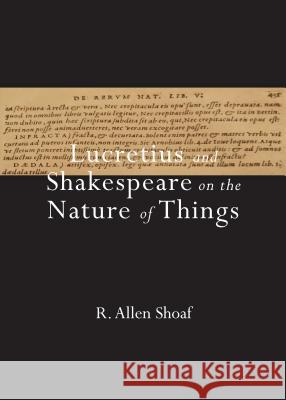Lucretius and Shakespeare on the Nature of Things » książka
Lucretius and Shakespeare on the Nature of Things
ISBN-13: 9781443865319 / Angielski / Twarda / 2014 / 165 str.
Lucretius and Shakespeare on the Nature of Things maps large, new vistas for understanding the relationship between De rerum natura and Shakespeare's works. In chapters on six important plays across the canon (King Lear, Macbeth, Hamlet, The Merchant of Venice, The Tempest, and A Midsummer Night's Dream), it demonstrates that Shakespeare articulates his erotics of being, his great creating nature (The Winter's Tale), by drawing on imagery he learned from Ovid and other classical poets, but especially from Lucretius, in his powerful epic that celebrates Venus and her endless creativity. Responding to Lucretius's widely admired Latinity in his exposition of the life of man in nature, Shakespeare emerges as an early modern materialist who writes poetry that is effectively atomic, marked (as we might say today) by fission (hendiadys, for example) and fusion (synoeciosis, for example), joining and splitting, splitting and joining language and character as no other poet has ever done -- To give away yourself keeps yourself still; My grave is like to be my wedding bed; I begin / To doubt the equivocation of the fiend / That lies like truth. Readers of Shoaf's book will encounter anew, through both fresh evidence and close reading, Shakespeare's universally acknowledged commitment to the art of nature and the nature of art. With Lucretius's poetry as inspiration, Shakespeare becomes the poet of the material, both in art and in nature, immensely creative with his dAedala lingua like dAedala natura-his wonder-crafting tongue like wonder-working nature.











